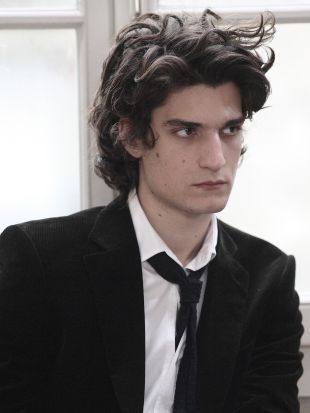
Chuck Berry once said he wrote so many songs about high school because practically everyone had been there, so they could easily understand what he was talking about. You could reasonably say the same thing about love, and there are few people who embrace the notion of love at its most melodramatic with more enthusiasm than teenagers, so one might expect that a French film about high school romance wouldn't be all that different from its American or British counterparts. But Christophe Honoré's La Belle Personne (literally The Beautiful Person) sure doesn't play like the average movie about l'amour among high schoolers; even amidst young people who theatrically revel in agony as a habit, it's hard to image a more dour group of kids than those who populate this film, in which attraction never seems simple or satisfying for anyone.
In La Belle Personne, Léa Seydoux plays Junie, a lovely 16-year-old girl who has just transferred to a new school after the death of her mother. Junie's cousin Mathias (Esteban Carjaval Alegria) is showing her around the campus and introducing her to his friends when she begins attracting the attention of several of her new classmates, in particular nerdy but earnest Otto (Grégoire Leprince-Ringuet). Junie is taken with Otto and they stumble into something like a romance, but he's hardly the only one interested in her. Nemours (Louis Garrel) teaches Italian at the school, and he's handsome in a carefully disheveled bohemian manner, looking only a few years older than his charges. Nemours is already juggling affairs with Florence (Valerie Lang), another teacher on the faculty, and Marie (Agathe Bonitzer), one of his students, but when he sees Junie he breaks up with both of them and begins quietly but ardently pursuing her. Junie, still emotionally fragile after her mother's passing, is torn between her feelings for Otto, who is almost too sincere in his love for her, and Nemours, who is good looking and certain of himself but clearly capable of hurting her in a way Otto is not. Meanwhile, Mathias is also dealing with his own romantic dilemmas as he tries to come to terms with a secret love that could change the way his friends and rivals see him.
While many filmmakers tackling the theme of young love go for a light touch and play the inexperience and naïveté of their characters for humor, director and co-screenwriter Christophe Honoré clearly remembers the emotional gravity and painful longing that's part and parcel of falling for someone at 16, and in La Belle Personne he admirably takes his characters' feelings as seriously as they do. (The script was loosely adapted from Madame de La Fayette's 17th century novel La Princesse de Clèves, with the emphasis on "loosely.") Unfortunately, Honoré has a hard time telling the difference between the languid and the meandering, and the slow drift of the narrative, along with his habit of wandering into subplots that dull the emotional impact of the picture, undercuts the impact and clarity of the final product. La Belle Personne is refreshing in its refusal to portray 16-year-olds as fools ruled by their hormones, but ultimately Honoré goes too far in the other direction; as beautiful as Léa Seydoux is, she never escapes from a gloomy shadow that makes Junie a bit hard to care for, and Grégoire Leprince-Ringuet's constant pining as Otto fares little better. Louis Garrel cuts a commanding figure as Nemours, but he takes so little pleasure in his talent as a lady-killer that he generates little admiration (or contempt) for his actions. While the age of consent in France is 15, making Nemours' liaisons with Marie legal in the letter of the law, the story never stops to ponder the ethical questions of his sleeping with his students, beyond a brief chat with another faculty member over drinks that treats the matter with a curious flippancy -- perhaps this isn't considered a matter of serious concern in Europe, but American audiences are likely to feel differently. And it's telling that the character who shows the greatest joie de vivre is Valerie Lang's Florence, who walks in and out of the story within the space of roughly ten minutes. La Belle Personne is more than a bit like its female protagonist Junie -- beautiful to look at and clearly heartfelt, but never as interesting as you would wish.
